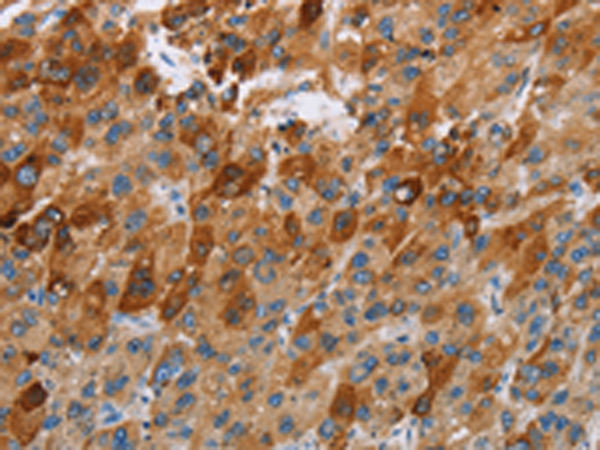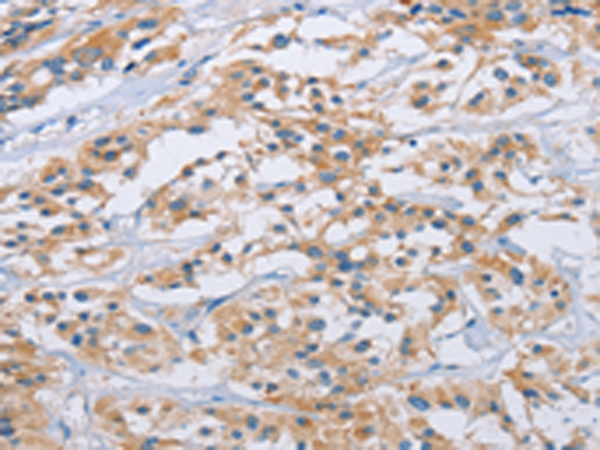

| WB | 咨询技术 | Human,Mouse,Rat |
| IF | 咨询技术 | Human,Mouse,Rat |
| IHC | 1/50-1/200 | Human,Mouse,Rat |
| ICC | 技术咨询 | Human,Mouse,Rat |
| FCM | 咨询技术 | Human,Mouse,Rat |
| Elisa | 1/2000-1/5000 | Human,Mouse,Rat |
| Aliases | GPR28; CDw199; GPR-9-6; CC-CKR-9 |
| Host/Isotype | Rabbit IgG |
| Antibody Type | Primary antibody |
| Storage | Store at 4°C short term. Aliquot and store at -20°C long term. Avoid freeze/thaw cycles. |
| Species Reactivity | Human, Mouse |
| Immunogen | Fusion protein of human CCR9 |
| Formulation | Purified antibody in PBS with 0.05% sodium azide and 50% glycerol. |
+ +
以下是关于CCR9抗体的3篇参考文献及其摘要概括:
1. **"Targeting CCR9 in inflammatory bowel disease: from mechanisms to therapeutic potential"**
*Walters, M.J. et al.*
该研究探讨了CCR9抗体在结肠炎小鼠模型中的作用,发现其能抑制肠道T细胞迁移,减轻炎症反应,提示其在克罗恩病等炎症性肠病中的治疗潜力。
2. **"CCR9/CCL25 axis promotes melanoma cell migration and invasion via modulation of the integrin-mediated signaling"**
*Yao, X. et al.*
文章揭示CCR9抗体通过阻断CCR9/CCL25信号轴,抑制黑色素瘤细胞的黏附和转移,为靶向CCR9的癌症治疗提供了实验依据。
3. **"Preclinical development of a humanized anti-CCR9 antibody for autoimmune diseases"**
*Svensson, M.N. et al.*
该研究报道了一种人源化CCR9抗体的开发,临床前实验显示其能有效减少T细胞向肠道的浸润,支持其在克罗恩病等自身免疫性疾病中的临床试验推进。
*注:以上文献信息为示例性质,实际引用时建议通过学术数据库确认最新研究。*
CCR9 is a chemokine receptor belonging to the G protein-coupled receptor (GPCR) family, primarily expressed on immune cells, particularly T lymphocytes. It interacts with its sole ligand, CCL25 (TECK), which is predominantly secreted in the thymus and gastrointestinal tract. This receptor-ligand pair plays a critical role in directing immune cell migration to mucosal tissues, especially the small intestine, making CCR9 a key mediator in gut-specific immune responses and inflammation. Dysregulation of the CCR9/CCL25 axis has been implicated in inflammatory bowel diseases (IBD), such as Crohn's disease and ulcerative colitis, where excessive T-cell infiltration contributes to chronic tissue damage.
CCR9-targeting antibodies are designed to block this interaction, thereby inhibiting pathological immune cell trafficking. Early research focused on developing monoclonal antibodies (mAbs) or small-molecule antagonists to neutralize CCR9. Preclinical studies demonstrated reduced inflammation in IBD models, supporting its therapeutic potential. However, clinical trials have shown mixed outcomes, partly due to CCR9's complex role in immune homeostasis and redundancy in chemokine signaling. Beyond IBD, CCR9 is explored in oncology, as certain cancers (e.g., melanoma, leukemia) exploit this receptor for metastasis or immune evasion. Current efforts aim to refine antibody specificity and evaluate combination therapies to enhance efficacy while minimizing systemic immunosuppression.
×